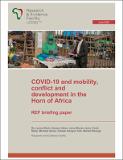| dc.description.abstract | The World Health Organisation (WHO) declared COVID-19 a pandemic on 11 March 2020 and the first cases in the Horn of Africa (HoA) were confirmed later that month. However, even before the virus reached the region its wider effects were being felt (Lawler 2020). In June 2020 as the crisis expands, and Africa confirms more than 100,000 cases, life in the region is changing significantly in a context of uncertainty.
On the one hand, with 1.5 per cent of global reported COVID-19 cases and 0.1 per cent of deaths, Africa is reported as the ‘least affected region globally’(The Lancet 2020). On the other hand, COVID-19 brings to Africa, and specifically for the purposes of this paper to the Horn of Africa, a new set of risks to health, economic dynamics and food security. It also overlaps with the region’s existing complex crises and risks, including locust invasions, disruptive and unpredictable climate patterns and events, pre-existing economic vulnerability, youth unemployment, food insecurity, and a high prevalence of underlying health conditions (Regional Desert Locust Alliance 2020; Majid and Hammond 2020). In the absence of an appropriate and robust response, there is a risk that the medical services in African countries will be overwhelmed by the pandemic, the safety nets of the population will be eroded, and livelihoods will be seriously compromised. | en_US |

